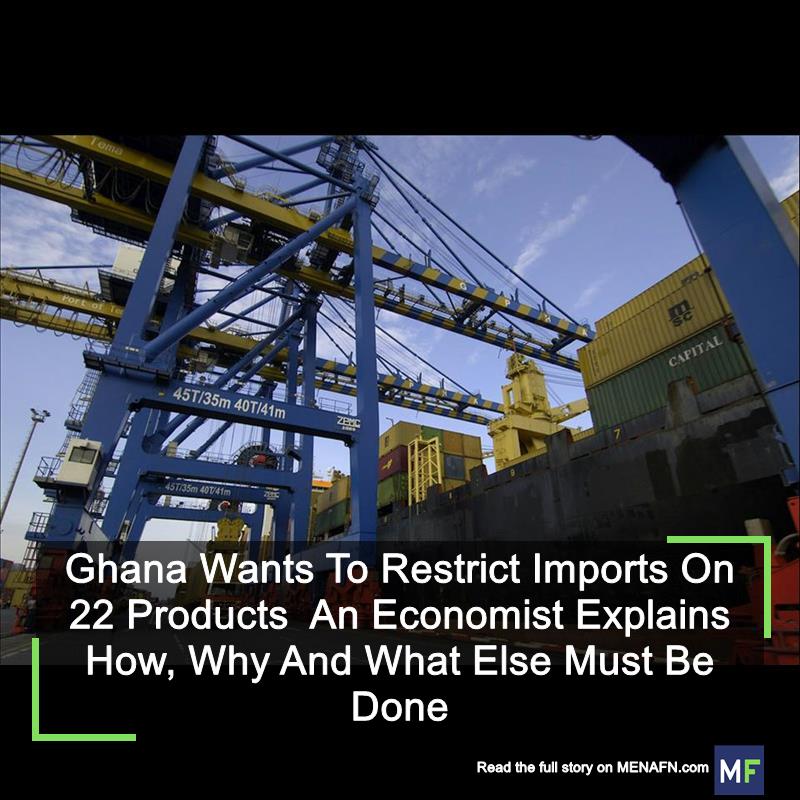
Ghana Wants To Restrict Imports On 22 Products An Economist Explains How, Why And What Else Must Be Done
These refer to the various schemes, mechanisms and regulations that a government can impose to restrict or limit the importation of goods and services. They come in different forms.
Tariffs : These are taxes imposed on imported goods and services. They can be specific taxes (a fixed amount per unit) or ad valorem (a percentage of the value) or both.
Quotas : This means a direct restriction on the quantity of a particular good that can be imported at a specified period of time. It is enforced by issuing licences to individuals or firms.
Embargos and sanctions : This involves a ban on the importation of a particular good. Importing a banned good is illegal.
Quality standards and technical barriers : A country can set stringent requirements that imported goods must meet.
Local content requirements : In terms of this regulation a specified fraction of a final good must be produced domestically, either in physical units or in value terms.
The choice of a particular form of import restriction depends on the geopolitical, economic and social characteristics of the country.
What role does it play as an economic strategy?Protection of domestic and infant industries : Restrictions such as tariffs and quotas can raise the prices of imported goods and make domestic goods more competitive . This can stimulate local producers to produce more, grow and develop.
Revenue to the government : Import restrictions such as tariffs are a source of revenue for the government.
Balance of payments and trade deficits management : Import restrictions help in correcting balance of payment issues and can reduce trade deficits . This can help countries achieve economic gains needed for long term growth and development.
Environmental and health considerations : These restrictions can also help address environmental and health concerns .
Excessive import restrictions can backfire, however, if foreign countries retaliate.
Why is Ghana considering import restrictions?A number of reasons have led to this.
Health concerns : There have been concerns about the quality of some of the imported food items and pharmaceuticals.
Protection of domestic and infant industries : Cheap imports are leading to the collapse of domestic firms . They are suffering from high borrowing costs and eroding capital as a result of inflation. The government can protect them by placing restrictions on some of these cheap imports. That will make them competitive, and save foreign exchange.
Trade deficits and balance of payments support : These restrictions will reduce imports. All else being equal, they will improve the country's trade balance and balance of payments. The government will have enough foreign exchange reserves and be able to finance its developmental agenda.
Revenue to the government : One of the International Monetary Fund conditions for financial assistance to Ghana is that government must increase tax revenues. It can do this through tariffs.
Stabilise the currency : These restrictions will reduce the amount of foreign currency used for imports . This increases the forex supply and helps to stabilise the currency.
Have other African countries done this?The East African Community , comprising Kenya, Rwanda, Burundi, Tanzania, Uganda, South Sudan and the Democractic Republic of Congo, has numerous import restrictions. These countries have a common external tariff on the cost, insurance and freight value of imports. And they ban some goods such as some pharmaceuticals, narcotic drugs, firearms and ammunition, explosives, pornography, genetically modified products and plastic bags.
South Africa, Botswana, Lesotho, Eswatini and Namibia as part of the Southern African Customs Union also administer a common external tariff on imports from other countries. They ban or have quotas on some goods such as narcotics and habit-forming drugs.
Nigeria has its own restrictions on some products. These include rice, pork, beef, live or dead birds including frozen poultry, cocoa butter, spaghetti and some pharmaceuticals.
What is the way forward?In addition to the import restrictions, the following recommendations could assist Ghana.
Diversification of the economy : Ghana must support industries beyond traditional sectors like agriculture and mining. Investing in technology, innovation and value-added production can contribute to a more resilient economy.
Investment in education and skills development : This can involve investments in science, technology, engineering and mathematics education to meet the demands of a modern and diverse economy.
Infrastructure development : Invest in critical infrastructure such as roads, ports and energy to reduce transportation costs, enhance connectivity and attract investment.
Promotion of export-oriented industries : By focusing on products and services that have demand in the international market, Ghana can boost its export earnings and improve its trade balance.
Trade facilitation and ease of doing business : Simplify trade processes and make it easier to do business. Streamlining customs procedures, reducing bureaucratic hurdles, and enhancing the overall business environment can attract investments and promote economic growth.
Enhanced agricultural productivity : Invest in research and development. Promote sustainable farming practices, introduce modern technologies and improve access to markets for farmers.
Corruption mitigation : An environment of good governance can attract investments and build confidence in the business community.
Continuous policy review : Economic policies must adapt to changing circumstances. Flexibility and responsiveness to economic conditions are crucial for effective governance.
Inward looking or import substitution strategies have been adopted by many countries at the early stages of their development. The critical question is how much to produce to meet demand, and what quality. All stakeholders must ensure production to meet demand while ensuring quality.

Legal Disclaimer:
MENAFN provides the
information “as is” without warranty of any kind. We do not accept
any responsibility or liability for the accuracy, content, images,
videos, licenses, completeness, legality, or reliability of the information
contained in this article. If you have any complaints or copyright
issues related to this article, kindly contact the provider above.


















Comments
No comment